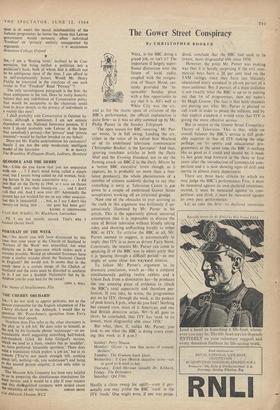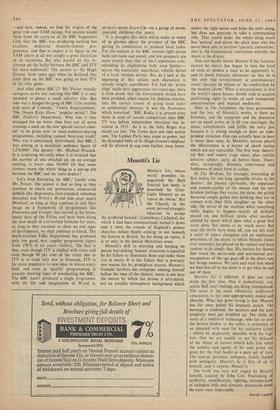The Gower Street Conspiracy
By CHRISTOPHER BOOKER WELL, is the BBC doing a grand job, or isn't it? The important if largely super- fluous discussion over the future of local radio, coupled with the resigna- tion of Stuart Hood, cer- tainly provided the 're- v sponsible' Sunday press with a fine opportunity to say that it is. All's well at' White City was the cry, and as for the recent spate of criticism of the
BBC's performance, the official explanation is quite firm—as it was so ably summed up by Mr. Philip Purser in the Sunday Telegraph.
The open season for BBC-sneering,' Mr. Pur- ser wrote, 'is in full swing. Leading the cry, either in the voice of its editor Iain Macleod or of its embittered television commentator' Christopher Booker, is the Spectator.' And thus, ignoring trenchant articles in both the Daily Mail and the Evening Standard, not to say the flaming attack on BBC-2 in the Daily Mirror by a 'senior BBC executive' (even though, as it
appears, he is probably no more than a free- lance producer), the whole phenomenon of a number of citizens suddenly daring to say that something is awry at Television Centre is put down to a couple of embittered Gower Street conspirators working off an irrational grudge.
Now one of the obstacles to ever arriving at the truth in this argument was brilliantly if un- consciously illumined by Mr. Purser in his article. This is the apparently almost universal assumption that it is impossible to discuss the
state of British television without blindly taking sides, and showing unflinching loyalty to either BBC or ITV. To criticise the BBC at all, Mr. Purser seemed to suggest, is automatically to imply that ITV is as pure as driven Fairy Snow. Conversely, the nearest Mr. Purser can come to speaking ill of the BBC was to admit coyly that it is 'passing through a difficult period'—as one might of some close but wayward relative.
To follow Mr. Purser's argument to its dramatic conclusion, watch as—like a conjurer simultaneously pulling twelve rabbits and a Union Jack from a diminutive hat—he produces the one amazing piece of evidence to clinch the BBC's total superiority and therefore per- fection. If you take, he wrote, the programmes put on by ITV, through the week, at the peakest of peak hours, 8 p.m., what do you find? Nothing but canned corn, most of it American, and one bad British detective series. Wh"h all goes to show, he concluded, that ITV has 'sunk to its lowest, most disgraceful ebb since 1958.'
But what, then, if, unlike Mr. Purser, you look to see what the BBC is doing every even- ing this week at 8 p.m.?
Sunday: Perry Mason.
Monday: Glynis—`a new film series of comedy
thrillers.'
Tuesday: The Graham Stark Show.
Wednesday: Z Cars (British detective series—not
as good as it used to be).
Thursday: Ethel Merman (usually Dr. Kildare).
Friday: The Defenders.
Saturday: Old Film.
Hardly a clean sweep for uplift—even if per- sonally one may prefer the BBC 'trash' to the ITV 'trash.' One might even, if one was preju- diced, conclude that the BBC had sunk to its lowest, most disgraceful ebb since 1958.
However, the point Mr. Purser was making was that 'it is hardly surprising if the evil com- mercial boys have a 28 per cent lead on the TAM ratings, since they have just blatantly abandoned every standard in all-out pursuit of a mass audience. But if pursuit of a mass audience is not exactly what the BBC is up to in putting out that lot of programmes, then my name's Sir Hugh Greene. The fact is that both channels are putting out what Mr. Purser is pleased to call trash in order to please the millions, and by that explicit standard it would seem that ITV is giving the more effective service.
But to return to the Gower Street Conspiracy Theory of Television. This is that, while on overall balance the BBC's service is still prob- ably superior to that of ITV (taking the edge perhaps on its sports and educational pro- grammes), at the same time the BBC is nothing like as good as it could and should be; it made its last great leap forward in the three or four years after the introduction of commercial com- petition and it is now showing signs of drift and inertia in almost every department.
There are three basic criteria by which we may judge the BBC's performance. First, it must be measured against its own declared intentions; second, it must be measured against its com- petition; and third, it must be measured against its own past performance.
Let us take the first—its declared intentions —and here, indeed, we find the origins of the great row over TAM ratings. For anyone would think from the carry-on of the BBC Supporters Club that the BBC was producing nothing but excellent, dedicated minority-interest pro- grammes, and that to expect it to figure in the TAM charts at all was simply a gross distortion of its intentions. But who started all this in- sistence on the battle between the BBC and ITV for mass audiences? The answer is—Sir Hugh Greene, three years ago, when he declared that from then on the BBC was going to beat ITV at its own game.
And what about BBC-2? Mr. Purser roundly castigates us'for not realising that BBC-2 is only intended to please a small selective elite. But who was it banged the gong of BBC-2 for months with news of 'Comedy,' Family Entertainment,' 'The Danny Kaye Show,' popular serials'? The BBC Publicity Department. Who was it that arranged for no fewer than four out of seven evenings a week on the new 'special interest chan- nel' to be given over to mass-audience-chasing programmes, including canned American trash? Who was it announced, beforehand, that BBC-2 was aiming at a minimum audience figure of 1,250,000? The answer—Mr. Michael Peacock. Is it surprising we smile when it is revealed that the number of sets switched on, on an average evening, is fewer than 90,000! Or that some viewers resent the whole thing as a put-up job between the BBC and the radio dealers?
'Let's Stop Knocking the BBC,' loyally cries Mr. Purser. The answer is that so long as they continue to churn out pretentious, amateurish rubbish like Impromptu (low-standard suburban charades) and Writer's World (the poor man's Monitor), so long as they continue to rest their image on a framework of programmes like Panorama and Tonight that started in the brave, heady days of the Fifties and have been dying the slow death of overworked formulae for years, so long as they continue to show no real signs of development, we shall continue to knock. The much-vaunted Talks Department has produced only one good, new, regular programme (apart from TW3) in six years—Gallery. The fact is that, even though ITV is riddled with vices, and even though 90 per cent of the credit due to ITV is in truth only due to Granada, ITV is far more responsive to new ideas in almost every field, and even in 'quality' programming is actually showing signs of overhauling the BBC. The BBC hasn't produced a single programme with the life and imagination of World in Action's recent Seven-Up—on a group of seven- year-old children—for years.
It is thoughts like these which make so many of us gloomy about the prospect of the BBC getting its commission to produce local radio. For the malaise at the BBC extends right across both television and sound; and few prospects are more dismal than that of the Corporation over- extending its elephantine bulk even further— across the essentially superficial, volatile duties of a local wireless service. But, as I said at the beginning of this article, such discussion is already largely superfluous. For had the 'pirate ships' made their appearance two years ago, there is little doubt that the Government would have been prodded, albeit maybe for dubious reasons, into the correct course of giving local radio to commercial interests. It was the Economist which remarked: 'BBC Radio is at present even more in need of outside competition than BBC TV was before independent television was in- vented in 1955.' As it is, the Jolly Roger was raised too late. The Tories dare not take action now. The Labour Party may come to power, but the distended belly of Sir Hugh Greene's elephant will be allowed to sag even further, even lower.



































 Previous page
Previous page